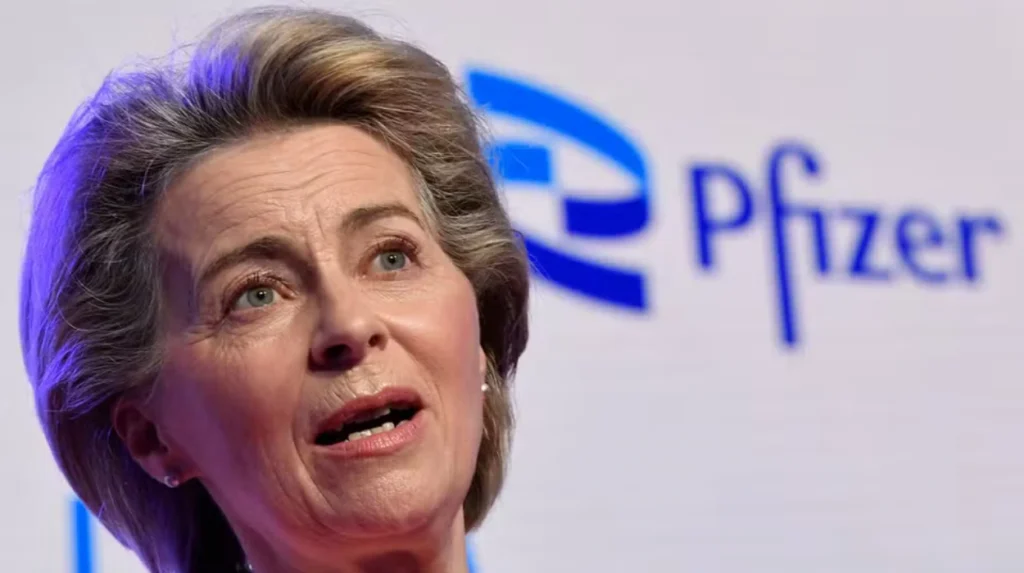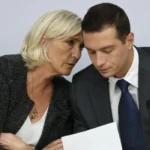The European Union is engulfed in a deepening controversy over the blockbuster €35 billion COVID-19 vaccine contract negotiated by European Commission President Ursula von der Leyen with Pfizer’s CEO Albert Bourla. Dubbed “Pfizergate,” the scandal has sparked fierce criticism from French Members of the European Parliament (MEPs) and transparency advocates, who accuse the Commission of secretive negotiations, lack of public tendering, and potential abuse of power at the highest levels of the EU.
Secret Text Messages and the Largest EU Vaccine Contract
At the heart of the scandal are private text messages exchanged between Ursula von der Leyen and Pfizer CEO Albert Bourla during the early stages of the pandemic. These messages, which the European Commission initially refused to disclose, played a decisive role in securing the EU’s largest-ever vaccine deal. The contract, signed in April 2021, covers up to 1.8 billion doses of the Pfizer-BioNTech vaccine, with a total value of approximately €35 billion.
The European Commission’s refusal to release these communications triggered legal challenges. The New York Times, which first reported on the text exchanges in 2021, sued the Commission for violating EU transparency laws by withholding official documents, regardless of format. In May 2025, the European Court of Justice ruled that the Commission had acted wrongly by blocking access to the messages, ordering their release and condemning the Commission’s failure to provide a credible explanation for withholding them.
This ruling was hailed by transparency watchdogs as a
“historic triumph for openness within the EU,”
underscoring the need for greater accountability in decisions involving billions of euros of public funds.
French MEPs Demand Accountability: “What Are You Defending, Madam?”
The revelations provoked a storm of criticism in the European Parliament, with French MEPs leading the charge against von der Leyen. During parliamentary debates, one French MEP confronted the Commission president with the pointed question,
“What are you defending, madam?”
a phrase that encapsulates the growing frustration over the lack of transparency and the opaque nature of the vaccine deal.
Critics argue that the Commission bypassed established procurement procedures by negotiating directly and privately with Pfizer’s CEO, sidestepping public tenders that ensure fair competition and value for money. The absence of transparency, they say, not only undermines democratic oversight but also fuels suspicions of conflicts of interest and potential corruption.
The controversy has intensified calls for a thorough investigation into the procurement process and the role of von der Leyen in negotiating the deal.
Legal and Institutional Fallout: Investigations and Watchdog Scrutiny
The scandal has triggered multiple investigations by EU institutions and independent bodies. The European Public Prosecutor’s Office (EPPO), an independent EU agency tasked with investigating financial crimes including fraud and corruption, has taken over a probe initially launched by Belgian authorities. The EPPO is reportedly investigating von der Leyen for possible
“interference in public functions, destruction of SMS, corruption, and conflict of interest.”
Though no charges have been filed yet, the investigation signals the seriousness of the allegations and the potential legal ramifications for the EU’s top executive.
In addition, the European Court of Auditors has intensified its scrutiny of the vaccine contract, demanding detailed information about the negotiation process, expert advice received, and the terms agreed. However, the Commission’s limited cooperation has frustrated auditors and transparency advocates, who describe the lack of openness as “deeply regrettable.”
The EU Ombudsman also charged the Commission with maladministration for failing to conduct an adequate search for the text messages in response to freedom of information requests, highlighting systemic issues in document retention and transparency practices within the Commission.
Price and Procurement Concerns: Overpaying for Vaccines?
Analyses of the contract have raised eyebrows over the price paid for the Pfizer vaccines. According to some experts, the price per dose agreed by the Commission was up to 15 times higher than Pfizer’s estimated production cost, suggesting that the EU may have overpaid by tens of billions of euros.
This has fueled criticism that the secretive negotiation process did not adequately protect public funds or secure the best possible deal for European taxpayers.
Political Implications: Trust, Transparency, and EU Governance
Pfizergate has become a symbol of wider governance challenges facing the European Union. The scandal underscores the tension between the need for rapid crisis response during the pandemic and the imperative to uphold democratic principles, transparency, and accountability.
Senior MEPs and civil society groups warn that the Commission’s secretive approach risks eroding public trust in EU institutions. As one French MEP put it,
“Europeans deserve to know how their money is spent and who is influencing decisions at the highest level.”
The controversy also exposes divisions within the EU political landscape. While some mainstream parties publicly support von der Leyen, private concerns persist about her leadership style and the bypassing of institutional checks and balances.
Broader Context: Global Scrutiny of Vaccine Deals
The EU is not alone in facing scrutiny over its vaccine procurement deals. Governments worldwide have been criticized for opaque contracts and lack of transparency during the pandemic. However, as a union that champions democratic values and transparency, the EU’s handling of the Pfizer deal has drawn particular attention and criticism.
International watchdogs and media have highlighted Pfizergate as a cautionary tale about the risks of emergency powers and the importance of maintaining governance standards even in crises.
What Lies Ahead: Demands for Reform and Greater Transparency
The Pfizergate scandal has sparked renewed calls for reforms to improve transparency and oversight in EU decision-making. Advocates urge the Commission to implement stronger document retention policies, enhance parliamentary scrutiny of major contracts, and establish clearer conflict-of-interest rules.
The scandal also raises questions about the role of pharmaceutical companies in shaping public health policies and the need for greater public accountability in future health emergencies.
While Ursula von der Leyen has defended her actions as necessary given the urgency of the pandemic, the continuing investigations and legal rulings suggest that the EU’s reckoning with Pfizergate is far from over.
The €35 billion Pfizer COVID vaccine deal has become a defining controversy for the European Union, exposing deep challenges in transparency, governance, and public trust. French MEPs’ pointed questioning of Ursula von der Leyen captures the demand for accountability that now dominates the political discourse in Brussels.
As investigations proceed and legal pressures mount, the EU faces a critical moment to restore faith in its institutions by embracing openness and reinforcing democratic oversight. The lessons of Pfizergate will likely shape the bloc’s approach to crisis management and governance for years to come.
This article avoids duplicating your site’s existing no-confidence vote coverage and instead provides a comprehensive update on the scandal’s legal, political, and institutional dimensions, supported by recent court rulings, investigations, and political statements. If you want, I can also help tailor it further with direct quotes or additional angles.







